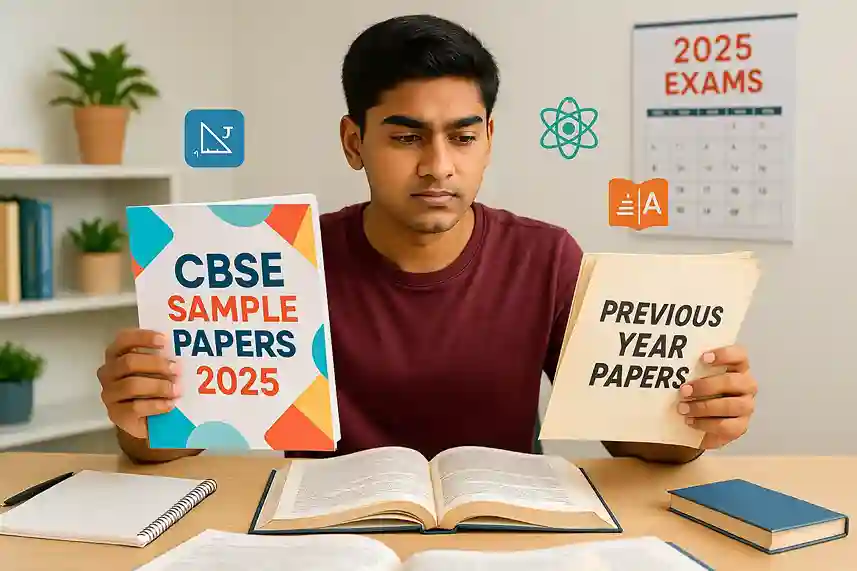Choosing the smarter way to practice for CBSE 2025 board exams
CBSE students often wonder whether to focus on sample papers or previous year papers. This blog explains their benefits, limitations, and the best strategy to ace the 2025 board exams.

As the CBSE 2025 board exams approach, students are often caught in the debate between practicing with sample papers or relying on previous year papers. Both resources serve unique purposes and are widely used by toppers and teachers. But how do they differ, and which one should you prioritize? Let’s break this down in detail so you can plan your preparation effectively.
Every year, CBSE releases official sample papers for all major subjects. These papers are designed to reflect the latest exam pattern, marking scheme, and weightage. For 2025, the emphasis continues on competency-based questions, case studies, and application-based reasoning. By solving sample papers, students get a realistic preview of the type of questions they will face.
Another important aspect of sample papers is the marking scheme. CBSE publishes detailed solutions with step marking, giving students clear insight into what examiners expect. This helps in fine-tuning answer presentation and understanding how partial credit is awarded.
Previous year papers are like a goldmine of exam insights. They reveal recurring question trends, commonly tested concepts, and the difficulty level of actual exams. Many students have found that solving the past 5 to 10 years’ papers helps them identify patterns, such as frequently repeated questions in mathematics or commonly tested themes in social science.
For example, Class 10 Science often repeats diagrams and short-answer questions on topics like electricity or periodic classification. Recognizing these trends helps students prioritize their revision and avoid surprises on exam day.
While both sample and previous year papers are powerful tools, relying on only one type has drawbacks. Sample papers may not always predict the exact difficulty level, especially if CBSE decides to make the exam tougher. On the other hand, previous year papers can sometimes feel outdated since CBSE updates its exam pattern and syllabus regularly.
The best results come when students balance both resources and use them strategically.
The smartest approach for 2025 exams is a balanced one. Start with CBSE sample papers to familiarize yourself with the updated format and marking scheme. Once confident, shift to solving at least the past 5 years’ papers to practice under real exam-level difficulty. By doing so, you prepare for both the present and the patterns of the past.
Experts recommend alternating between the two. For example, attempt a sample paper on one weekend and a past year paper on the next. This keeps practice fresh and covers all angles.
Sample papers help students adjust to new types of competency-based questions, while previous year papers highlight important theorems and frequently tested problems.
In science, sample papers are useful for updated case-based questions. However, previous year papers ensure you revise diagrams, numerical problem types, and definitions that CBSE tends to repeat.
Sample papers are critical because the comprehension passages and grammar section formats often change. Previous year papers, meanwhile, help students analyze essay and letter-writing trends.
Previous year papers are highly valuable here, as many short-answer questions on events, dates, and maps are repeated. Sample papers help with understanding how competency-based questions are being introduced.
Simply solving papers is not enough. Students must practice under strict exam conditions. Set a timer for three hours and attempt the paper without breaks. This trains you to manage your writing speed, avoid spending too much time on one section, and build exam stamina. After attempting, compare your answers with the marking scheme to realistically assess your performance.
Students should also rotate papers across subjects in the same week to simulate the actual exam schedule and reduce fatigue.
Here’s a simple roadmap for students preparing for the 2025 exams:
Start with NCERT textbooks and ensure conceptual clarity.
Solve at least 3 to 5 CBSE sample papers per subject to grasp the latest pattern.
Move on to the past 5 years’ papers, ideally completing one every week.
Analyze mistakes, revise weak topics, and reattempt tough papers.
In the last month before exams, alternate between sample and previous year papers under timed conditions.
By combining both resources with consistent revision, students can build confidence, sharpen time management, and walk into the exam hall fully prepared.
The key is not choosing between sample or previous year papers but learning how to integrate both into a smart preparation plan.

How to Prepare for the New CBSE Competency-Based Question Format
Mastering the new CBSE exam format for better academic performance

CBSE Question Paper Analysis: Trends You Must Know for 2025 Exams
Unlocking the secrets of CBSE question papers for smarter exam preparation

Top 10 Mistakes Students Make During Board Exam Preparation
Learn how to avoid common pitfalls in board exam preparation

CBSE Science Practical Exams: The Complete Student Guide
Master your CBSE Science practical exams with confidence and skill.